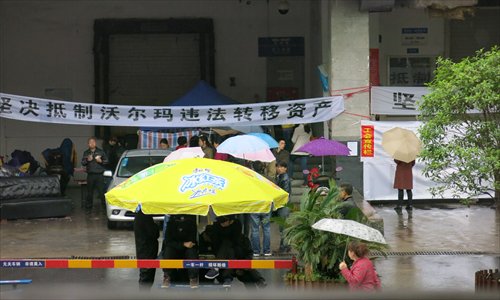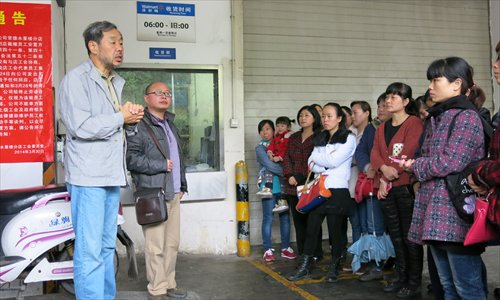HOME >> CHINA
Elected trade union in China gives Wal-Mart unprecedented hassle
By Li Qian in Changde Source:Global Times Published: 2014-4-24 23:17:00

Laid-off Wal-Mart workers guard the closed store as people hired by Wal-Mart (front, in black) try to remove goods still in the store in Changde on March 22. Photo: Li Qian/GT

Professor Chang Kai (L) speaks to the laid-off Wal-Mart workers as Huang Xingguo (second from left) listens during a meeting before the labor union submits their second arbitration application on April 21.
Encircled by a group of laid-off workers, Huang Xingguo, chairman of the labor union in their recently shut down Wal-Mart store, rallied his union members with a rousing speech about their ongoing battle with the international supermarket chain.
In order to boost morale, he introduced their legal consultant, Chang Kai, to the crowd. Chang, dean of the Institute of Labor Relations, Renmin University of China, briefed the crowd on the legal process they are engaged in, as the half circle of people, mostly women and some with small kids, watched hopefully and pressed the circle smaller and smaller.
"Your efforts to claim your rights have the potential to make a difference. You must strive for unity in order to win!" Chang told the crowd.
Most of them made 1,100 yuan ($176) a month at the Wal-Mart store in Changde, Hunan Province, but they lost their jobs on March 5 when the store announced it would close due to low turnover. Two weeks later, on March 19, the store was closed and started removing its stocks.
According to the compensation plan offered by the company, each of the 135 workers would have received a one-off payment based on their serving terms in the store. However, half of the workers have still been arriving at the store on time every day, refusing to accept the compensation plan, which they say was unilaterally made by the store owners and thus was illegitimate.
The labor union accuses the company of breaching China's Labor Law and the Trade Union Law by failing to inform the workers of the store closure one month in advance and failing to consult with the labor union regarding compensation for the workers.
Now the workers are trying to prevent products from being removed from the store unless their requirements are met. They erected a tent outside the store and took turns guarding the entrance 24/7. In the meantime, the labor union committee, led by Huang, is aggressively trying to bring Wal-Mart to the negotiation table through arbitration and legal means.
Independent labor union
In a structural reshuffle to get rid of less profitable stores, Wal-Mart has closed more than a dozen branches around China. It has previously used the same closing scheme as it did for the Changde branch without trouble.
This time, the campaign by the workers was led by their labor union, which is determined to rectify what they say is mishandling by the company, and is doing its utmost to maximize the compensation for the workers.
On April 22, the labor union delivered the arbitration application to the Changde Bureau of Arbitration for Labor and Personnel Disputes.
It was their second attempt to persuade the authorities to assist in resolving the labor dispute. Previously on March 24, the labor union demanded in its first arbitration application that Wal-Mart must withdraw its unilateral compensation scheme and sit down with the labor union to negotiate. It was rejected by the arbitration bureau, which cited the labor law as saying that only the employers or the employees are entitled to file a labor arbitration application. The labor union as an organization, even though it represents the workers' interests, could not initiate an arbitration application, according to the bureau.
However, the labor union and its legal consultants believe that the Labor Law did not forbid the labor union to represent the workers in the legal process to resolve such disputes.
This time, the labor union came back and filed two applications. One was in the name of five worker representatives, demanding Wal-Mart negotiate with the workers, the other requested that the arbitration authorities recognize the legitimate role of the labor union to represent the workers in the negotiations.
The arbitration bureau received their files and has five days to decide whether to open the case.
"The most conspicuous feature of this case is the role played by the labor union. Without it enthusiastically fighting for the workers' rights, it would have only been among the standard labor dispute cases in China," said Chang.
The only difference between the Changde store and other Wal-Mart branches, as Chang said, is that its labor union was elected by the workers.
Wal-Mart began establishing labor unions in its supermarkets in 2006, heeding the call of Chinese labor authorities, and has now covered all its stores. However, like the labor unions in many Chinese companies and institutions, the ones in Wal-Mart stores were usually appointed by executives and rarely defy the company's administration.
Forty-two-year-old Huang is the central figure of the Changde union. Working from the lowest level in the store, Huang was promoted step by step to administrative manager. He was then elected unanimously by the workers to be chairman of the labor union last year.
According to the relocation plan of the company, Huang was offered the same position at another branch store in the provincial capital Changsha. He almost accepted the offer, until he saw how a team of company staff talked down to a worker during their "negotiation" for compensation.
"The workers, generally with a poor education background, rarely have any legal know-how, while the negotiation team of the company is comprised of human resource professionals and labor law experts. It's totally unbalanced," he said. As a result, the workers could easily be cheated and fall into their traps. "I felt strongly that I had to do something for the workers, as I had been elected and am trusted by them."
It's common practice that companies in China settle labor disputes with the workers one by one, as most grass-roots labor unions don't really fight for the workers' interests in such circumstances, according to Chang.
Huang said Wal-Mart didn't treat the labor union seriously. The company informed Huang on March 4 of the closing scheme which was announced the next day, but the labor union should have been consulted by the company according to the Labor Union Law.
"That's because they have always behaved that way in other Chinese branch stores and forgot the Changde labor union was elected," he said.
"If the company showed due respect to the labor union, we would have been the company's best assistant in the process of closing the store," he said.
Disputes with authorities
Chang has come to Changde twice with his four-member team, all law professors at universities in Beijing. They are enthusiastic about this case because they see the potential for it to set an example of how a company labor union can strive to protect workers' rights, which is still rare in China. Furthermore, "this case should straighten out the legal interpretations of the law when it comes to accommodating laid-off workers in the future, otherwise it will be a social problem," said the labor law expert.
Therefore, securing the role of the company labor union in resolving the case has become a priority for Professor Chang's legal assistance, which is unprecedented in labor disputes in China. The Changde arbitration authorities have yet to accept the union's application to represent the workers.
However, not all law professionals have the same view. Zhang Jinqian, a Changde local lawyer working with the Changde Federation of Trade Unions, the official organization, sharply disagreed with Chang, and insisted on representing the workers rather than the labor union as most lawyers did.
"Talking about theories can never resolve practical issues. I once won a case representing more than 100 workers," Zhang said during a meeting in which the company labor union tried to seek help from the labor union federation. "Forcefully inserting the labor union into the negotiations is a bad approach," he told the Global Times.
"The usual way of resolving such cases by local authorities is to finish it quickly," said Fan Wei, associate professor with the School of Labor Economics at the Capital University of Economics and Business, who is also a member of Chang's team.
In the early stage of protests by the Wal-Mart workers following the store's closure, Changde police harassed the demonstrators and detained a labor union activist for five days.
"At first there was misconduct by the district police. They did it out of pressure to maintain stability … The Federation fully supports your demand," said Luo Yahai, vice chairman of the Changde Federation of Labor Unions, an official organization that oversees all grass-roots labor unions.
The Changde federation of labor unions had issued a formal letter that requested Wal-Mart to answer the calls of the workers, but the letter was rejected by the company.
According to Fan, Zhang's approach may increase the compensation for each worker by a one month's salary or two, but the company labor union aims to double the compensation as Wal-Mart may be subject to punishment for its misconduct.
After a short discussion, Huang and other members of the labor union committee agreed to entrust Chang's team to represent them in their arbitration application and, if the arbitration fails, the lawsuit against Wal-Mart. They expressed fears that local legal assistance might become entangled with vested interests.
"We have chosen a path that could lead to an uncertain future… But it couldn't get worse, because now we are already in the worst situation," Chang told the crowd of workers.
Posted in: In-Depth